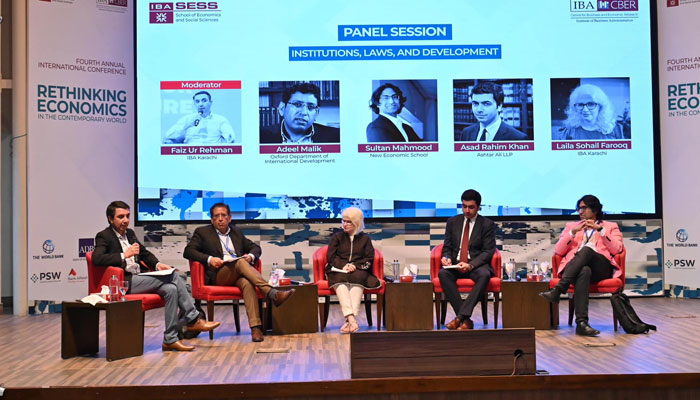IBA organises 4th Annual International Conference on Rethinking Economics
The IBA hosted the 4th Annual International Conference on “Rethinking Economics”, which was organized in collaboration with the IBA’s School of Economics and Social Sciences (IBA-SESS) and the Center for Business & Economic Research (IBA-CBER).
In his opening remarks, Dr. S Akbar Zaidi, Executive Director, IBA Karachi, expressed gratitude and welcomed the participants to the conference. Dr. Zaidi emphasized the need for interdisciplinary and innovative approaches to economic challenges, inspiring academics, and policymaking, and for students to envision sustainable & inclusive solutions for the future.
Kiyoshi Taniguchi, Regional Lead Economist & Marcel Schröder, Country Economist, Asian Development Bank (ADB), shared insights from the Asian Development Outlook, forecasting 5% growth for developing Asia in 2024. The priorities for Strategy 2030, focusing on climate action, private sector growth, and digital transformation were highlighted as the country’s pressing challenges.
Dr. Lubna Naz, Director, IBA-CBER, delivered the welcome address. She presented the vision of the conference and emphasized the significance of expanding on traditional economic thinking. She highlighted that IBA-CBER received a huge response to the call for papers and received 300 research papers while only 40 were selected after a rigorous review. The 25% of the panelists and presenters this year comprised women, reflecting on IBA’s commitment to promoting gender equality in economic research and thinking. Participants from 11 countries participated in the conference and 50 presenters and panelists from within the country, including highly marginalized areas of Pakistan.
The panel discussion “Rethinking International Trade in a Digitalized World” emphasized digitalization in trade, export competitiveness, reduced costs, and seamless operations. Key challenges included weak digital infrastructure, limited cross-border interoperability, and governance gaps.
Economic experts in the parallel sessions emphasized innovation and reforms for Pakistan’s sustainable growth, spotlighting initiatives like Pakistan Single Window to modernize trade. Dr. Zaidi and Dr. Ali Cheema, Vice Chancellor, LUMS, discussed higher education challenges in Pakistan, highlighting issues like funding, talent retention, and quality control. They emphasized the role of economists as university leaders, institutional reforms, and nurturing critical thinking and innovation. The session explored globalization’s impact and fostering community engagement.
Day 2 featured a panel discussion “Institutions, Laws, and Development”. The panelists included Adeel Malik, Associate Professor, Oxford Department of International Development; Asad Khan, Partner, Ashtar Ali LLP; Sultan Mehmood, Professor, New Economic School, and Laila Farooq, Assistant Professor, IBA-SESS. The experts discussed the perspectives of the laws and institutional development in Pakistan & other countries and the role of laws in building societies.
-
 Ethan Hawke Reflects On Hollywood Success As Fifth Oscar Nomination Arrives
Ethan Hawke Reflects On Hollywood Success As Fifth Oscar Nomination Arrives -
 Tom Cruise Feeling Down In The Dumps Post A Series Of Failed Romances: Report
Tom Cruise Feeling Down In The Dumps Post A Series Of Failed Romances: Report -
 'The Pitt' Producer Reveals Why He Was Nervous For The New Ep Of Season Two
'The Pitt' Producer Reveals Why He Was Nervous For The New Ep Of Season Two -
 Maggie Gyllenhaal Gets Honest About Being Jealous Of Jake Gyllenhaal
Maggie Gyllenhaal Gets Honest About Being Jealous Of Jake Gyllenhaal -
 'Bridgerton' Star Luke Thompson Gets Honest About Season Five
'Bridgerton' Star Luke Thompson Gets Honest About Season Five -
 Prince William On Verge Of Breakdown Because Of 'disgraced' Andrew
Prince William On Verge Of Breakdown Because Of 'disgraced' Andrew -
 Tig Notaro Reflects On Oscar Nod For 'Come See Me In The Good Light': 'I Was Sleeping'
Tig Notaro Reflects On Oscar Nod For 'Come See Me In The Good Light': 'I Was Sleeping' -
 Kenyon Sadiq Sets 40-yard Dash Record At NFL Scouting Combine, Eyes First Round
Kenyon Sadiq Sets 40-yard Dash Record At NFL Scouting Combine, Eyes First Round -
 Talk Show Host Drops Hint About Taylor Swift, Travis Kelce Wedding Date
Talk Show Host Drops Hint About Taylor Swift, Travis Kelce Wedding Date -
 Andrew Scandal Brings New Worries For Prince Harry, Meghan Markle
Andrew Scandal Brings New Worries For Prince Harry, Meghan Markle -
 King Charles Imposes New Restrictions On Ex-Prince Andrew In Surprise Move
King Charles Imposes New Restrictions On Ex-Prince Andrew In Surprise Move -
 Chris Hemsworth Reveals How Elsa Pataky Guides His Career Moves
Chris Hemsworth Reveals How Elsa Pataky Guides His Career Moves -
 Was Travis Barker In A Relationship With Kim Kardashian Before Marrying Her Sister?
Was Travis Barker In A Relationship With Kim Kardashian Before Marrying Her Sister? -
 Brad Pitt Feeling Down In The Dumps After Kids' Snubs As Pals Continue To Paint Angelina Jolie A Villain
Brad Pitt Feeling Down In The Dumps After Kids' Snubs As Pals Continue To Paint Angelina Jolie A Villain -
 Ex-PM Speaks Out On Andrew Mountbatten-Windsor In Newspaper Column
Ex-PM Speaks Out On Andrew Mountbatten-Windsor In Newspaper Column -
 Eric Dane Remembered In Glowing Tribute By Trans Activist In 'Grey's Anatomy'
Eric Dane Remembered In Glowing Tribute By Trans Activist In 'Grey's Anatomy'




